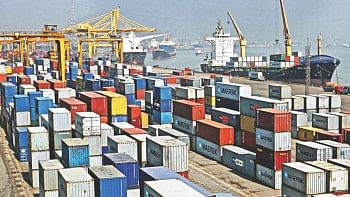Loosening grip on senseless honking

Honking of horn in front of hospitals is prohibited but anybody hardly cares. Photo: STAR
It was 4:30pm on Wednesday. The intersection near the railway crossing at Mohakhali was a sea of vehicles. Hundreds of tattered city buses, private cars, covered lorries, three wheelers and taxis from three different directions were trying to inch towards Moghbazar.
They were not doing it quietly.
A black sedan tried to park near a corner, leading the driver of a white van to consistently blare out his horn. A pickup truck veered around the sedan, stopping a city bus in the middle of the intersection, prompting all others to honk.
This was a random five-minute sample of what city dwellers say is now a common condition on most roads especially at rush hours and before the iftar.
Experts say the indiscriminate and unnecessary use of powerful vehicular horns is the primary source of noise pollution in the city.
Research reports from World Health Organisation (WHO), Unicef and World Bank (WB) say noise pollution is one of the 12 environment pollutants that cause 30 serious diseases. They can range from loss of hearing to problems with unborn babies.
With some fanfare, the city began installing ''Don't Honk'' signs in February last year at various points of some major city intersections and a number of VIP streets. The purpose, traffic policemen said at the time, was to remind motorists that there is a law against unnecessary noise ''and that the city is ready to enforce that law.''
The idea was to implement the Motor Vehicles Ordinance of 1983 that forbids honking within 200 yards of places of worship, educational institutes, hospitals, courts and offices. Primarily, the Dhaka Metropolitan Police (DMP) banned honking on the VIP road between the stretch of Sonargaon crossing and Bangabandhu Sheikh Mujib Medical university intersection.
The ban was later extended to several other VIP and posh residential areas including Dhanmondi, Gulshan and some important locations.
The red-white-and-blue signs, banners threaten a Tk 200 penalty. However, allegedly most 'fines' paid are around Tk 100 or less, which are usually kept off the record by traffic policemen. So, the chances that a violator will actually receive a summons are virtually zero.
"I dislike the use of horns. In fact, I scold my chauffeur all the time for excessive honking," said Shahan Ara, a housewife from Mohakhali. "I am aware that horns are prohibited in many streets. So, most of the times, I tend to hold my breath fearing that a traffic police would stop my car for honking. But it never actually happens."
However, traffic policemen say thousands of cars are being fined for honking in the city everyday.
"On an average, around two thousand cars are fined everyday in the West (Tejgaon) zone alone," said a traffic sergeant on duty at the Kazi Nazrul Islam Avenue. "I cannot deny that majority of vehicles get away with honking. But, given the sheer number of cars honking unnecessarily, it is not possible to fine every car during rush hours."
In the city, millions of people -- especially children -- are exposed to unabated noise pollution, which is worsening rapidly due to new vehicles fitted with 'powerful' horns. Although hydraulic horns are banned, 'normal' horns now used in smaller vehicles are just as harmful.
A random survey shows that most private vehicles are fitted with two powerful horns. Children can sustain a permanent hearing damage if exposed to the piercing sound of these horns from a closed proximity.
Traffic officials suggest the vehicle owners should be forced to remove the second horn, thus reducing the power of the horn.
"During fitness tests, the BRTA should ensure that the additional horn is removed from every vehicle," said Kibria, a traffic sergeant.
A study carried out by the Department of Environment (DoE) about two years ago showed that the decibel level in residential areas and commercial areas was several hundred more than permissible to human health.
The standard set by the DoE allows the noise level between 45 and 75 decibels depending on the zone. In residential areas, for example, the maximum level of noise allowed is 50 decibels during day and 45 at night. And in industrial areas, it could be as high as 75 decibels during daytime and 70 at nights.
The DoE officials admitted that 'there is no doubt' that noise pollution has worsened in the city even in the so-called 'silent zones'.
“I have lived in Dhaka my whole life and the situation has shown little improvement throughout the years,” said Md Jamaluddin, a freelance writer who resides in Mohakhali. “When you are on the street, you cannot talk to anybody or speak over the cell phone, you cannot hear the radio news, you cannot listen to a piece of music. You cannot be in your own mind.”
Even traffic sergeants complained of loss of hearing ability. Under clause No. 139 of the Motor Vehicle Act, 1983, they can prosecute anybody using 'hydraulic horns'. But the fine for such offences is so small that the offenders care little about it.
Sergeant Shafiur, who joined the police force only a years ago, told this correspondent that he has already become short of hearing.
"Almost all traffic policemen are short of hearing given the amount of time they spend amid the frenzied street chaos and all the honking," he said.
Sergeant S Kabir said the police should have portable equipment to measure the decibel level and prosecute offenders accordingly.
"We are aware of it. We know the damages noise pollution can do to people," he said. "We try to make the situation as convenient as possible, but it is not always possible due to the chaotic transport system in the city.”

 For all latest news, follow The Daily Star's Google News channel.
For all latest news, follow The Daily Star's Google News channel. 



Comments